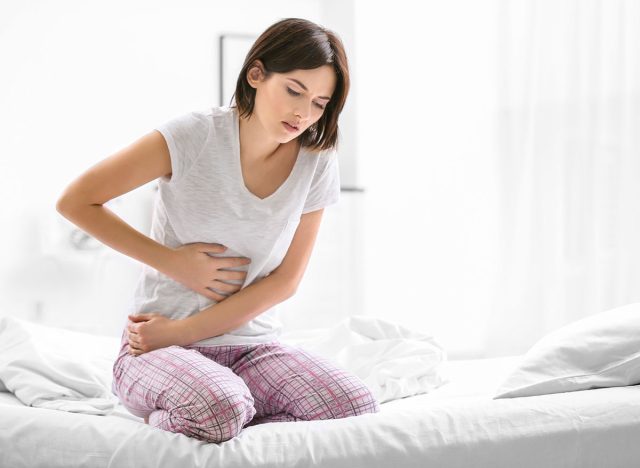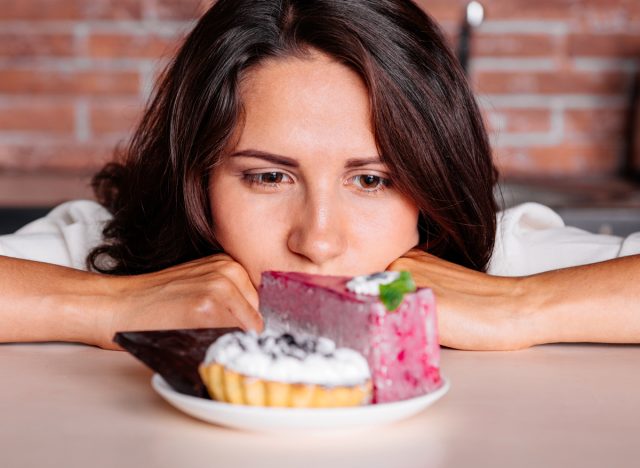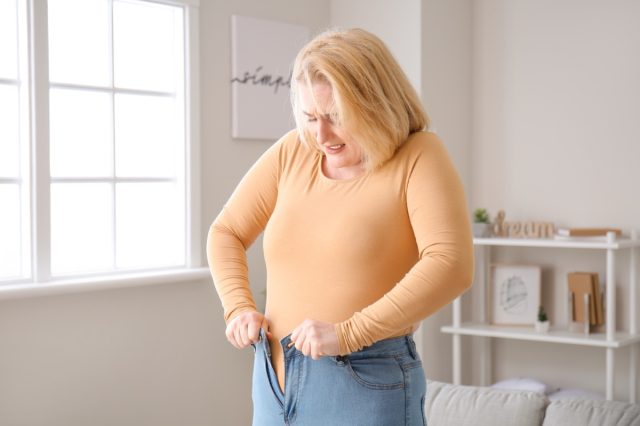Here’s why you should trust your gut.
“All disease begins in the gut,” Hippocrates said over 2,000 years ago. The gut, or gastrointestinal (GI) system, impacts the health of the entire body, including your mood and immune function. “A healthy gut contains healthy bacteria and immune cells that ward off infectious agents like bacteria, viruses and fungi,” says Sooraj Tejaswi, M.D., MSPH. “A healthy gut also communicates with the brain through nerves and hormones, which helps maintain general health and well-being.” Here are five signs your gut is out of kilter. Read on—and to ensure your health and the health of others, don’t miss these Sure Signs You’ve Already Had COVID.
1. Digestive Problems

One of the most obvious signs of an unhealthy gut is constant digestive problems—this can include IBS (Irritable Bowel Syndrome), diarrhea, a change in bowel movements, and more. “Everyone at some point experiences digestive problems such as abdominal pain, bloating, loose stools, constipation, heartburn, nausea or vomiting,” says Dr. Tejaswi. “When symptoms persist, it may be a sign of an underlying problem that needs medical attention.”
2.Skin Rash

Many studies have shown the link between gut health and skin health. “The health of our gut influences the health of our brains and vice versa, so it really shouldn’t come as a surprise that gut health has an impact on other organs such as the skin,” says Doug Cook, RDN.
“Gut microbiomes influence the pathophysiology of acne, a skin condition that occurs when your hair follicles become plugged with oil and dead skin cells,” says Dr. Raj Kumar, clinical professor of biochemistry at the University of Houston College of Medicine. “A link between intestinal dysbiosis (a persistent imbalance of gut microbiomes) and atopic dermatitis has been shown.”
3. Sugar Cravings

Intense sugar and carbohydrate cravings could be a symptom of bad gut bacteria. “Unhealthy gut bacteria is a lot like a forest fire,” says Traci D. Mitchell, M.A., M.S. “Unhealthy gut bacteria is fierce, dangerous and can grow out of control quickly. Think of sugar as wind. When you add sugar to the mix, bacteria grow like crazy. You’re fanning the flames on the fire! Increasing good gut bacteria helps you curb cravings for carbs and sugar, mostly because bad bacteria feed on foods that convert to sugar, and on a physiological level, communicates to your body that you need more – increasing cravings. Needless to say, increasing gut bacteria also means you’ll stay closer to a more optimal weight than if your body was full of bad bacteria.”
4. Sleep Issues

Did you know your gut health has an impact on your sleep—and vice versa? “Sleep apnea and other sleep airway disorders can impair your gut microbiome,” says Dr. Michael Gelb, DDS, MS. “When your microbiome is less diverse, it can affect production of serotonin and melatonin which affects your ability to sleep. In an animal study this disruption caused inflammation and insulin resistance – precursors to heart disease and diabetes.”
5.Is My Unhealthy Gut Making Me Fat?

Struggling to get rid of the COVID 15? Your unhealthy gut may be sabotaging your weight-loss efforts. “When we eat food, our gut breaks it down into small pieces,” says Anthony L. Komaroff, M.D. “Only the smallest pieces get absorbed into our blood. The rest is eliminated as waste material. In other words, not all of the calories in the food we eat get into our body and increase our weight. The gut bacteria help break down food. Some bacteria are better able to chop food into those smallest pieces that get digested, add calories to our body and thereby tend to increase our weight. Theoretically, if our guts have more of those kinds of bacteria, it should be harder to lose weight. We are just beginning to understand the role of gut bacteria in obesity, and the science hasn’t led yet to treatments that will make it easier to lose weight. However, I believe that day is coming.”
Credit: Source link